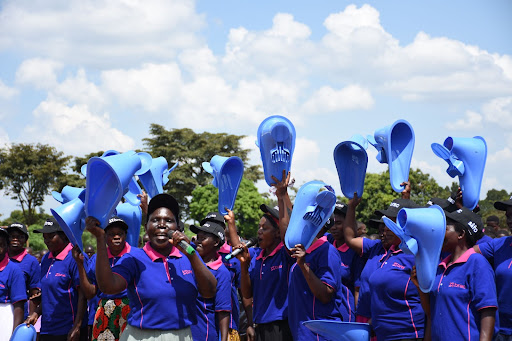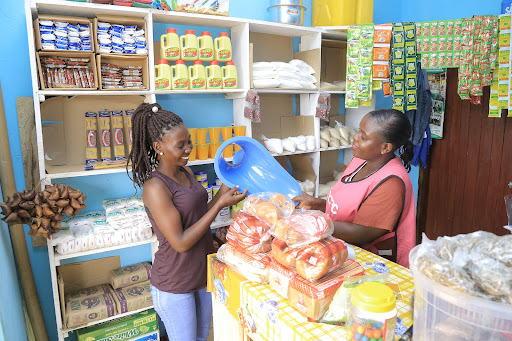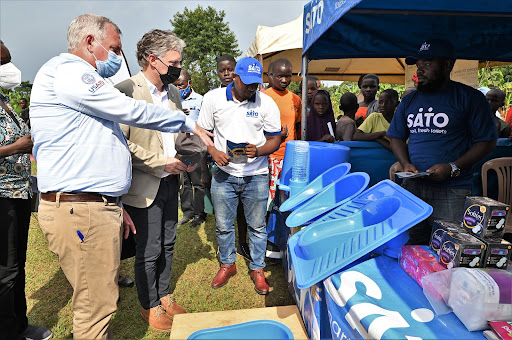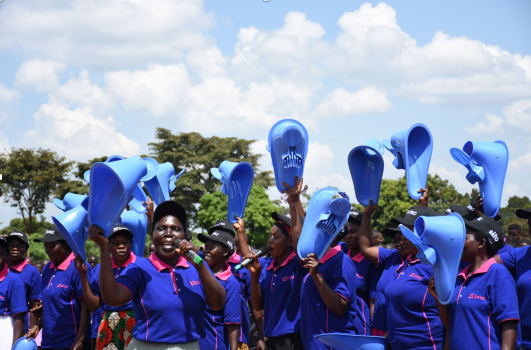
Photo credit: Dorothy Nabatanzi
People don’t spend much time thinking about toilets, but maybe they should: the product saves millions of lives each year.
Toilets and toilet pans dramatically reduce contamination and the spread of pathogens like cholera and dysentery, while eliminating the risk of children falling into pit latrine drop holes. Additionally, toilets can generate jobs. Local production, marketing, and installation of toilets and latrines creates new employment opportunities and stimulates local markets.
In Uganda, the potential for health and economic benefits from sanitation products is significant, as only 21 percent of households have access to basic sanitation. Unsafe sanitation conditions contribute to several thousand child deaths each year from diarrhea and other contamination-born diseases.
To help more Ugandans put safer sanitation within reach, USAID partnered with LIXIL, a global water and household technologies company, and Nice House of Plastics, a domestic manufacturer. From 2018-2023, the partnership expanded local production and distribution of a low-cost SATO toilet pan, which can be installed almost anywhere.
SATO is a subsidiary of LIXIL that designs affordable sanitation and hygiene solutions. Its toilet pan is engineered to flush with minimal water and stay closed when not in use. This makes the product a safe sanitation solution for communities in Uganda that don’t have sewer systems or running water.
“We had the ambition of improving sanitation both at household and institutional levels for the lower end of the market using our affordable sanitation products,” said Timothy Kayondo, the Uganda leader for SATO Toilets.
That ambition is paying off. Nice House of Plastics produced 79,000 SATO products for the partnership between 2019-2022 (out of 263,000 total SATO products produced) that were distributed and sold in 20 Ugandan districts, improving sanitation facilities for 370,000 people — close to one percent of the population.

Photo credit: USHA
The Nice House of Plastics, a woman-owned family business based in the Ugandan capital of Kampala, was established in 1970 and is currently the leading manufacturer of plastic products in Uganda, with over 50 products in its portfolio. The project has helped the company to consolidate its position in the plastics manufacturing industry. It now employs over 500 people and has expanded its capacity to meet domestic demand for high-quality plastic products.
USAID’s Uganda Sanitation for Health Activity (USHA) trained 500 predominantly female community health promoters and 227 hardware stores to stock and promote SATO products. Then, they trained masons to install the products and deployed an integrated media campaign to get the word out. The model of selling the toilet pans at hardware stores is now financially sustainable without the Agency’s continued support.

Photo credit: Kendra Helmer, USAID
“With the [USHA activity] concluded and a new global partnership with LIXIL, we are building off existing collaboration in other countries in Africa and Asia,” said USAID’s Policy and Partnerships Advisor for Water Security, Oliver Subasinghe.
“This is what we want to do with LIXIL globally, moving forward. We plan to launch four new country partnerships focused on local sanitation manufacturing and distribution by the end of the year,” Subasinghe added.
This private sector-led approach is an example of how water, sanitation, and hygiene interventions can provide benefits long after a USAID project is completed. SATO’s core business model is to provide sanitation and hygiene products for low-income customers in less developed settings, a goal that aligns well with USAID’s goal to increase equitable access to sustainable sanitation services.
ABOUT THIS STORY
Four out of five Ugandans do not currently have access to basic sanitation. To help more citizens put safer sanitation within reach, USAID partnered with LIXIL, a global manufacturer, and Nice House of Plastics, a domestic manufacturer to accelerate local production and distribution of the low-cost SATO toilet pan, which can be installed virtually anywhere. Between 2019-2022, Nice House of Plastics produced 794,000 SATO products for the partnership that were distributed and sold in 20 Ugandan districts, improving sanitation facilities for 370,000 people — close to one percent of the population.
By USAID Private Sector Engagement Team
This blog was originally published on the USAID Private Sector Engagement Exposure page.

